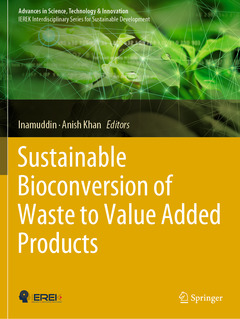Description
Sustainable Bioconversion of Waste to Value Added Products, 1st ed. 2021
Advances in Science, Technology & Innovation Series
Coordinators: Inamuddin , Khan Anish
Language: English
Subjects for Sustainable Bioconversion of Waste to Value Added Products:
Keywords
Bioconversion; Value added products; Animal waste; Food waste; Natural gas
Publication date: 04-2022
393 p. · 21x27.9 cm · Paperback
Publication date: 04-2021
393 p. · 21x27.9 cm · Hardback
Description
/li>Contents
/li>Biography
/li>Comment
/li>
This edited book discusses various processes of feedstocks bioconversion such as bioconversion of food waste, human manure, industrial waste, beverage waste, kitchen waste, organic waste, fruit and vegetable, poultry waste, solid waste, agro-industrial waste, cow dung, steroid, lignocellulosic residue, biomass, natural gas etc.
Nowadays, the industrial revolution and urbanization have made human life comfortable. However, this requires excess usage of natural resources starting from food and food products, to energy resources, materials as well as chemicals. The excess use of natural resources for human comfort is expected to high fuel prices, decline natural resources as well as cause a huge hike in the cost of raw materials. These factors are pushing researchers to grow environmentally friendly processes and techniques based on inexpensive and sustainable feedstock to accomplish such worldwide targets. Bioconversion, otherwise called biotransformation, is the change of natural materials, for example, plant or animal waste, into usable items or energy sources by microorganisms. Bioconversion is an environmentally friendly benevolent choice to supplant the well-established chemical procedures utilized these days for the production of chemicals and fuels. A variety of alternatives advancements are being considered and are directly accessible to acquire diverse valuable end-products through bioprocesses.This book discusses in detail the process and techniques of bioconversion by focusing on the organic feedstock of animal and plant origin. It brings solutions to the bioconversion of various feedstock into value-added products.
Dr. Inamuddin is currently working as assistant professor in the chemistry department of Faculty of Science, King Abdulaziz University, Jeddah, Saudi Arabia. He is also a permanent faculty member (assistant professor) at the Department of Applied Chemistry, Aligarh Muslim University, Aligarh, India. He has extensive research experience in multidisciplinary fields of analytical chemistry, materials chemistry, and electrochemistry and, more specifically, renewable energy and environment.
Prof. Abdullah M. Asiri is the Head of the Chemistry Department at King Abdulaziz University since October 2009 and he is the founder and the Director of the Center of Excellence for Advanced Materials Research (CEAMR) since 2010 till now. He is a Professor of Organic Photochemistry. He graduated from King Abdulaziz University (KAU) with a BSc in Chemistry in 1990 and a PhD from University of Wales, College of Cardiff, UK in 1995. He was promoted to a Professor in 2004. His research interest covers color chemistry, synthesis of novel photochromic, thermochromic systems, synthesis of novel coloring matters and dyeing of textiles, Materials Chemistry, Nanochemistry and nanotechnology Polymers and plastics. Prof. Asiri is the principal supervisors of more than 17Msc and one two PhD thesis; He is the main Author of ten books in different chemistry disciplines. He Published more than 400 research Papers in international Journals. Prof. Asiri is the Editor-in-Chief of King Abdulaziz University Journal of Science. A major achievement of Prof. Asiri is the discovery of tribochromic compounds, a class of compounds which change from slightly or colorless to deep colored when subjected to small pressure or when grind. This discovery was introduced to the scientific community as a new terminology Published by IUPAC in 2000. This discovery was awarded a patent from European Patent office and from UK patent and some other patents office in Europe. Prof. Asiri involved in ma
Discusses process and techniques of bioconversion
Highlights case studies on the bioconversion of various feedstock into value-added products
Includes the organic feedstock of animal and plant origin




